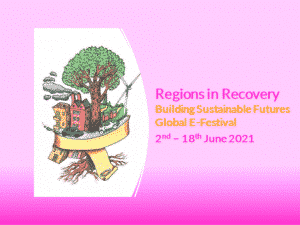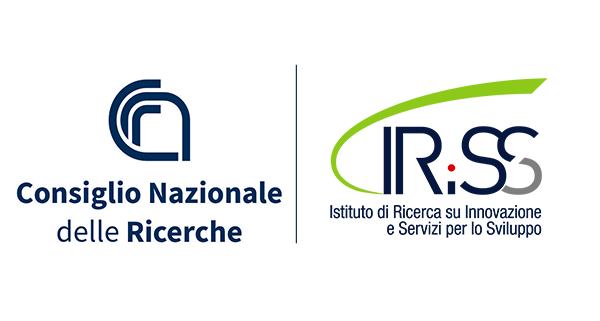The AESOP Thematic Group “Public Space and Urban Culture” organizes a special session within the Regions in Recovery. Building Sustainable Futures – Global E-Festival. Deadline call for abstract 17th March 2021. Event from 2nd June – 18th June 2021
 Regions in Recovery. Building Sustainable Futures – Global E-Festival, a multi-partner online event organized on 2nd June – 18th June 2021, represents an answer to the 2020 – the most extraordinary of years when conferences have been cancelled or postponed and normal flows of researcher engagement and networking have been heavily disrupted. Societies and research-led organizations (AESOP, FinGeo, LDnet, RSA Nordic Division – NORSA, Seminars in Economic Geography, Network on Infrastructural Regionalism – NOIR) will contribute to co-hosting a festival of regional and related research to be run globally.
Regions in Recovery. Building Sustainable Futures – Global E-Festival, a multi-partner online event organized on 2nd June – 18th June 2021, represents an answer to the 2020 – the most extraordinary of years when conferences have been cancelled or postponed and normal flows of researcher engagement and networking have been heavily disrupted. Societies and research-led organizations (AESOP, FinGeo, LDnet, RSA Nordic Division – NORSA, Seminars in Economic Geography, Network on Infrastructural Regionalism – NOIR) will contribute to co-hosting a festival of regional and related research to be run globally.
The AESOP Thematic Group “Public Space and Urban Culture” organizes the special session “What’s going on in public spaces and urban cultures? Updates on current research, policy and practice” within the Regions in Recovery. Building Sustainable Futures – Global E-Festival.
Description
Regions and cities appear to have been shaped through responses to a series of challenges and crises, including health or climate hazards, interruptions in economic growth, political upheavals or social transformations. Urban scholars and policy-makers frequently observe and engage with public spaces as arenas which embody both the challenges and responses. The challenges have been articulated in themes such as accessibility, healthy living, democracy, justice, social movements. Against a seemingly bleak outlook, public spaces and urban cultures also nurture optimistic responses. ‘The New Urban Agenda’, adopted by the UN-Habitat Conference, Habitat III, promotes public space as a key ingredient of ‘inclusive, connected, safe and accessible’ cities (UN Habitat, 2016).
This special session on “What’s going on in public spaces and urban cultures? Updates on current research, policy and practice” asks how public spaces can inform research, policy and practice towards creating ‘inclusive, connected, safe and accessible’ cities.
Contributions are invited, but are not limited to address one of the following topics:
- Changing typologies and roles of players and actors: multiplicity of publics and public space cultures, arenas for rebuilding participation;
- Public spaces and changes: climate change, social movements, circular economy;
- Changing needs and roles: homelessness, refugees, immigrants and integration, age, gender, social, cultural, ethnic and religious considerations and urban justice;
- Questioning the global north-south divide and public space dynamics;
- Changing role of public spaces in political conflict zones;
- Changing environmental awareness: public space as a buffer zone, contribution to public health (mental and physical well-being);
- Changing intangible cultural heritage: adapting the genius loci to multiple and dynamic cultural identities;
- The impact of technological innovation on public space research and practice.
This session is organized by the AESOP Thematic Group Public Spaces and Urban Cultures, which gathers an international and interdisciplinary group of researchers and practitioners, who contribute a plurality of perspectives. The group was established in 2010 under the umbrella of the Association of European Schools of Planning Education (AESOP). Since then, it promotes a dialogue between practitioners, academics, governmental and non-governmental professionals, and further interest groups through virtual and physical meetings, workshops, conferences and roundtables.
Deadline call for abstract 17th March 2021
Click here for details
Session Organisers
- Stefania Ragozino, National Research Council of Italy, Institute for Research on Innovation and Services for Development, Naples, Italy, s.ragozino@iriss.cnr.it
- Christine Mady, Notre Dame University-Louaize, Lebanon, christine.mady@ndu.edu.lb
- Tihomir Viderman, Brandenburg University of Technology Cottbus – Senftenberg, Germany, viderman@b-tu.de




You must be logged in to post a comment.